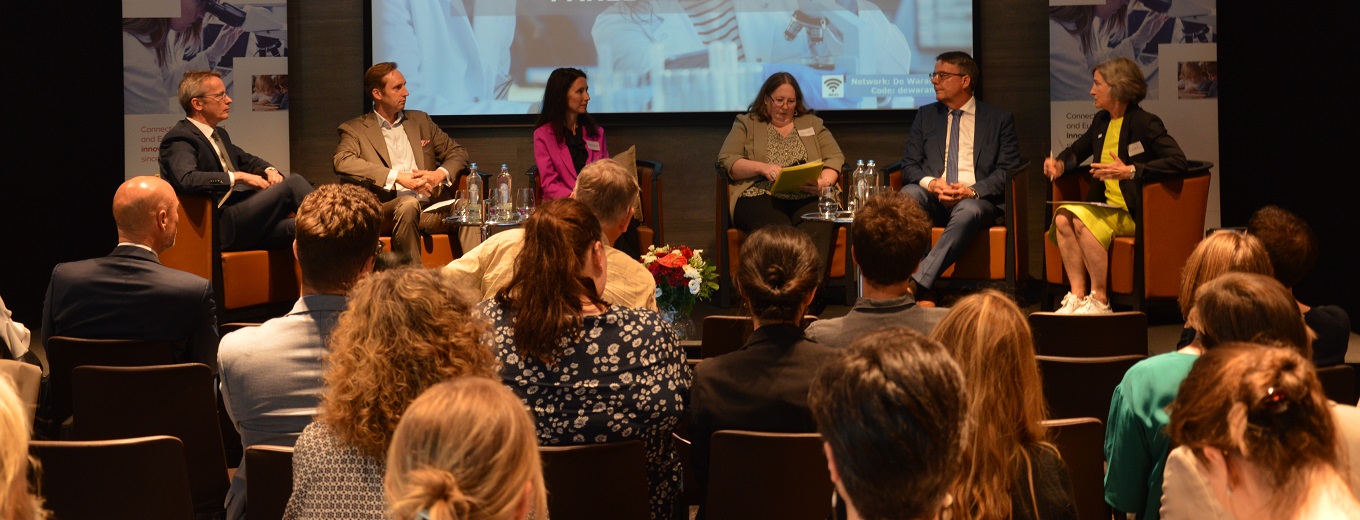Speakers and panellists explored how European university alliances and COST can advance collaboration across borders in education, research, and innovation.
The question ‘what makes knowledge networks thrive?’ was at the centre of the discussion. Switzerland’s State Secretary for education, research and innovation, Martina Hirayama, highlighted the importance of knowledge networks in her welcome address and emphasised: “Together we are stronger”. The State Secretary used the opportunity to underscore that even though Switzerland is currently not associated to EU programmes, “we are doing our best to offer Swiss actors the best possible opportunities to participate in the programme actions as a third country partner”. She explained that in the case of the ‘European Universities Initiative’, “we have provided federal funding for the four Swiss universities selected to participate in the call 2022. And we are preparing to offer sufficient support to the Swiss participants within this year’s call as well.” She stressed, however, that “I can assure you that the full participation in international programmes like Horizon Europe, Erasmus+ etc. has always been and still is a priority for the Swiss government.” Although Switzerland’s situation concerning opportunities to participate in Erasmus+ activities “is currently not satisfactory, the State Secretariat for education, research and innovation is doing everything possible to offer Swiss higher education institutions optimal access and the appropriate funding for international cooperation”, State Secretary Hirayama said.
She recalled that Switzerland joined the European Cooperation in Science and Technology (COST) as a founding member in 1971 and actively supported this important initiative that encourages scientists to connect and share research ideas and results. The State Secretary highlighted COST’s strong feature of easy access, “allowing especially young scientists as well as scientists from less-research-intensive countries to build and expand their networks”. Furthermore, she is convinced that the European Universities Initiative’s key features of establishing university alliances as strategic partnerships according to the bottom-up principle, the implementation of joint courses, and the use of synergies in administrative cooperation are elements that “contribute significantly to strengthening the competitiveness of the European Higher Education Area, which is close to our hearts”.
The rector of the University of Zurich, Michael Schaepman, in his keynote address ‘University Networks in the 21st Century’ pointed out that collaboration across borders are the cornerstone of research, education, and innovation, citing from an article in Nature: “Science doesn’t respect national boundaries, so it helps if scientists don’t have to either.” He emphasised the value of long-standing networks, which take time to build. Michael Schaepman covered a multitude of facets related to knowledge networks, including possible challenges like allowing different opinions and avoiding a tendency towards mainstream thinking in networks. The keynote provided an overview of the close integration of Swiss universities in the European academic community, professor Schaepman highlighted the strong commitment of the Swiss higher education sector to the European Research Area and the European Higher Education Area. This commitment is reflected in the strong interest of Swiss universities in joining European university alliances. The University of Zurich joined the Una Europa alliance last year, which focuses on the six areas cultural heritage, data science & AI, future material, Europe and the world, one health, and sustainability. Michael Schaepman gave the audience not only an overview on the networks the University of Zurich is part of – in addition to Una Europa also LERU since 2006 and Universitas21 since 2017 – but also focused on key features of the University itself and the ecosystem – or network – his university is embedded in in the Zurich area: Part of this local network is ETH Zurich, the university hospital Zurich, universities of applied sciences, the university of the arts ZHdK, and key sectors such as banking, finance, insurance, IT, as well as emerging sectors in the creative industry, lifelong learning, and a strong startup ecosystem.
Michael Schaepman set the scene for the discussion between distinguished panellists, moderated by Angelika Kalt, the director of the Swiss National Science Foundation (SNSF). Panellists not only focused on what works already well but also on challenges and the room for further improvement. Luc Sels, the rector of KU Leuven, pointed out the importance of strong links between research and education as key for the success of university alliances. He underscored that university alliances should not become closed networks and openness is important. He also made the case for the full integration of Switzerland and the United Kingdom in EU programmes, to strengthen Europe with these strong nations in the areas of science and higher education. Ronald de Bruin, the Director of the COST Association views the increasing importance of conditions for funding due to geopolitical considerations as challenging, as it stands in contrast to how science works. As Anna Fontcuberta i Morral, Member of the Presiding Board of SNSF and professor at EPFL, mentioned, one of the challenges of university alliances could be a tendency of teaming up with universities that are similar, as for instance with likeminded technical universities in the case of EPFL, while it is also important to develop networks including different types of universities. Amanda Crowfoot, Secretary General of the European University Association emphasised that for university alliances to be sustainable it is key that they don’t view the instrument only through a funding lens. Instead, it is important that universities ensure that their participation in an alliance is embedded at all levels of their institution. The point of Ronald de Bruin resurfaced in a question from the audience: How do universities deal with the EU’s focus on strategic autonomy. Panellists agreed that it is important to remain as open as possible and as closed as necessary. However, Michael Schaepman mentioned Open Science as key in this respect and views it as a competitive advantage.

